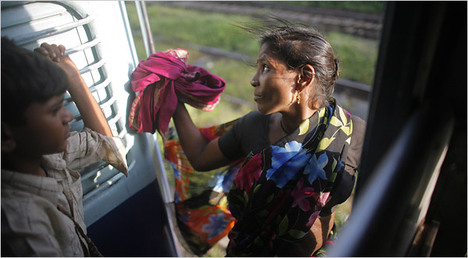 “Sarla Deepak Ire sells guavas on the Pushpak Express, from Lucknow to Mumbai, earning less than $3 a day.” Source of caption and photo: online version of the NYT article quoted and cited below.
“Sarla Deepak Ire sells guavas on the Pushpak Express, from Lucknow to Mumbai, earning less than $3 a day.” Source of caption and photo: online version of the NYT article quoted and cited below.
(p. 3) ABOARD THE PUSHPAK EXPRESS, India — The man with neatly parted hair stood in the doorway of the hurtling train. And then, at the perfect moment, he jumped.
This was not about suicide, however. It was about tea.
Having popped out of the door, he clung to the knobs and rods of the train’s exterior with one hand. His other hand gripped a vat of scalding tea tied to his belt.
He glided like a rock climber across the train’s epidermis, from one foothold to the next. He reached the steel beam that connected the cars and walked it like a tightrope. Then, arriving at the next car, he hopped onto more footholds and, at last, ducked inside to utter his sales pitch: “Tea! Tea! Get your hot tea!”
Such acrobatics are not required on most of the world’s trains, nor in this train’s first- and second-class cars, which are connected with inside passageways. But this was third class on the Pushpak Express, a $6, 24-hour ride ferrying migrants from India’s bleak heartland to the thriving coastal megalopolis of Mumbai, formerly Bombay. And in an echo of the ancient caste system, these passengers are physically sealed off from the compartments of the luckier born.
These passengers are also part of a great migration that is changing the world. Goldman Sachs, which has published projections about the Indian economy, predicts that 31 villagers will continue to show up in an Indian city every minute over the next 43 years — 700 million people in all. This exodus, with a similar one in China, helped push the world over a historic threshold this year: the planet, for the first time, is more urban than rural.
. . .
Sonu Gupta, 15, was one of what the veterans call “new men.” With his wiry frame, he looked more like 10. He was traveling with a friend from his village. If he can find work in Mumbai, Mr. Gupta will become his family’s breadwinner. “I’m happy,” he said, “and I’m scared.”
For the full story, see:
ANAND GIRIDHARADAS. “Rumbling Across India Toward a New Life in the City.” The New York Times, First Section (Sun., November 25, 2007): 3.
(Note: ellipsis added.)
